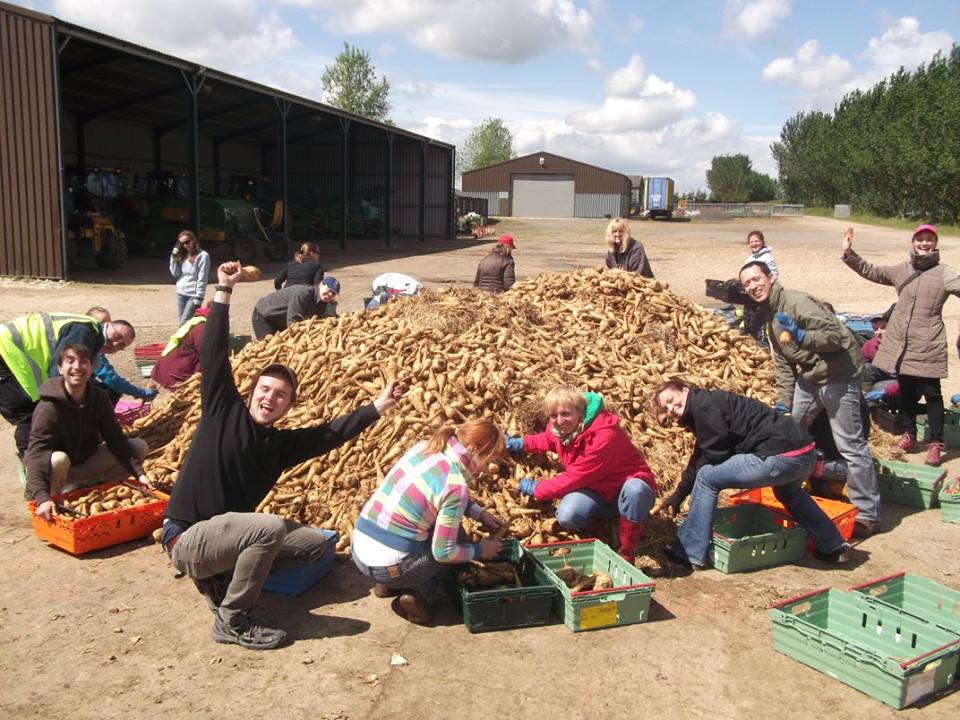United Kingdom
Redrawing the map on food waste – Feedback in the UK
2009-2018
This is where it all began. Feedback’s impact in the UK has included wide and transformative change to business practices, government policy and catalysing civil society action across different strategy approaches to food waste and sustainable food production. Here are a few highlights:
Growing the grassroots
Feedback’s spectacular events, including two Feeding the 5000 feasts in London’s Trafalgar Square kicked off prolonged and high profile media coverage of food waste, including two mainstream TV series featuring popular TV chefs: the Great British Waste Menu (2010) which was watched by 5.24 million people, and Hugh’s War on Waste (2016). Our founder Tristram Stuart’s TED talk has so far received 1.5 million views.
Feedback’s events brought local and national organisations together, forged alliances (for example our work with FareShare redistributing fresh and delicious surplus fruit and veg from farms). We also changed attitudes: The Sustainable Restaurant Association’s ‘The Discerning Diner’ survey showed that in 2013 food waste was the joint first issue that people wanted to restaurants to address -with 53% of respondents highlighting it. This was a large increase from 2009 when food waste featured much further down the list of key issues. The food Standards Agency’s Public Attitudes Tracker showed that food waste has risen as a concern from from 42% in 2010 to 51% in 2018.
“Feeding the 5000 has done more than any other single act to create a cultural shift in the attitude to food surpluses and waste in the UK. Without these attitudinal changes, we would not have broken the 10 million meals threshold or be receiving the level of support from the UK food industry that FareShare enjoys.” Lindsay Boswell, CEO, FareShare
Securing change in corporate practice
From a non-issue in 2009, Feedback’s work has meant few large food businesses can now afford to ignore their food waste. Feedback has consistently championed and challenged food businesses to be transparent on their food waste data, including waste in their supply chain, and to commit to ambitious targets to drive towards waste reduction. Tesco was the first UK supermarket to respond to our call in 2013, committing to reporting transparently on food waste throughout their supply chain, to achieving the Sustainable Development Goal of halving food waste by 2030, and by working with their suppliers to the same.
Our consistent pressure for radical transparency on food waste led in 2018 to nearly 90 major UK food businesses signing up to publish their food waste data and to commit to halving it by 2030, after years of a closed-doors approach.
“We have worked with Feedback for more than five years and their guidance and advice was instrumental in Tesco becoming the first UK retailer to publish the level of food waste in our own operations. Their insights have also helped us to develop initiatives to tackle food waste in our supply chains and in the homes of our customers.” Mark Little, Head of Food Waste Reduction, Tesco
 Feedback designed and launched the food use hierarchy, a tool to help businesses and public sector organisations understand how to avoid and manage food waste in the best way possible. Feedback’s food use hierarchy is now widely used to guide business food waste reduction strategies, including encouraging Tesco to introduce a new programme in 2018 to send surplus fruit and vegetables not fit for human consumption to animal feed.
Feedback designed and launched the food use hierarchy, a tool to help businesses and public sector organisations understand how to avoid and manage food waste in the best way possible. Feedback’s food use hierarchy is now widely used to guide business food waste reduction strategies, including encouraging Tesco to introduce a new programme in 2018 to send surplus fruit and vegetables not fit for human consumption to animal feed.
Feeding the 5000 London saw the launch of our high profile wonky fruit and veg campaign, to relax retailers’ cosmetic standards. In the two years after the launch event, ugly fruit and vegetables became the fastest growing sector of the fresh produce market and the National Farmers Union estimates that in 2012 this saved 300,000 tonnes of produce from being wasted on UK farms.
Produce World, one of the largest fruit and vegetable producers and distributors in Europe, who donated carrots for the event, developed an ongoing relationship with FareShare who now receive their fresh surplus as a result of the relationship that Feedback brokered through the event. A year after the event, Produce World reported selling 20% more carrots due to a relaxation of cosmetic standards.
“The Feeding the 5000 campaign has raised awareness of the food waste culture and has changed the way the food industry views the issue.” Andrew Burgess, Director of Agriculture at Produce World.
Legislative change
Feedback’s evidence from working closely with farmers in the UK, culminating in the report ‘Farmers talk Food Waste’ in 2018, and our investigations in UK supermarket supply chains overseas, resulted in our making a compelling case to the government for the establishment of an Adjudicator to oversee the UK groceries market. The Groceries Code Adjudicator was established in 2013, and has since then pursued investigations into two UK supermarkets for violations of the Code.